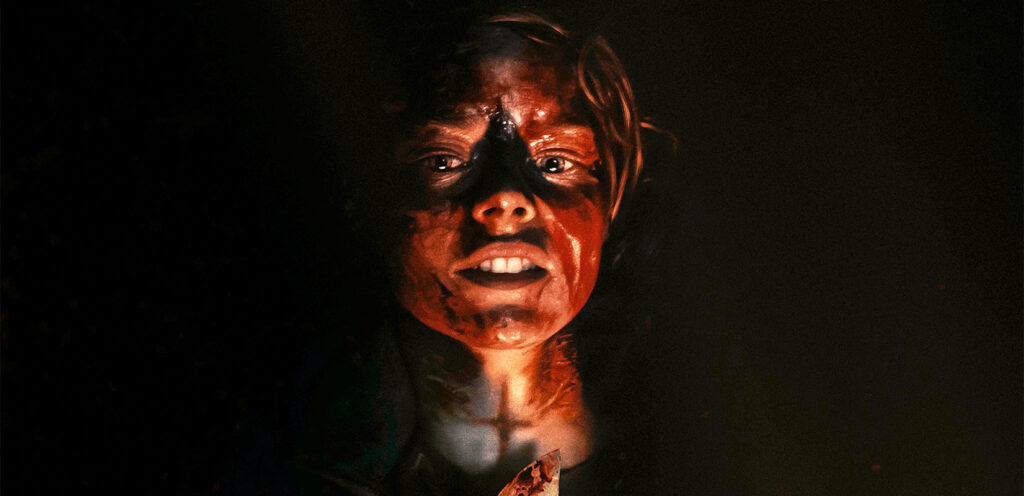From the start, Azrael introduces audiences to an intriguing concept: What if the Rapture happens and people become mute as a punishment for their “sin of speech?” While dialogue-free horror films aren’t new (e.g., A Quiet Place or Don’t Breathe), Azrael takes a more aggressive approach by significantly restricting spoken dialogue than its predecessors. It relies heavily on visual storytelling, body language, and facial expressions to communicate its narrative. As a result, Azrael is an ambitious attempt at high-concept horror. However, while Azrael shows promise, its execution leaves much to be desired. The movie excels in certain areas, particularly its atmospheric visuals and relentless gore. Unfortunately, it stumbles everywhere else.
Building a post-apocalyptic world with minimal dialogue is a gigantic challenge. Sadly, Simon Barrett’s script feels sparse since it offers little context or explanation for many of the film’s key moments. The only direction the audience receives comes in title cards quoting biblical passages and your imagination. While some horror movies thrive on ambiguity, Azrael often leaves its viewers in the dark. The film forces them to piece together the plot with minimal clues scattered throughout the film. This results in an inconsistent story that can feel more confusing than chilling.
While Samara Weaving shines, Azrael struggles to balance its eerie silence with a coherent story.
Also, the film’s repetitive pacing ultimately hampers its potential. The lack of narrative progression becomes frustrating after a while. Scenes start to blur together, and the film struggles to maintain the audience’s interest. The pacing feels stagnant, without dialogue or significant plot developments to drive the story forward.
Despite these shortcomings, Azrael does have its strengths. Namely, Samara Weaving. As seen in her previous roles—particularly in Ready or Not—Weaving has a remarkable ability to convey emotion through facial expressions and body language. In Azrael, she takes these skills to another level, especially since she carries much of the film’s emotional weight without uttering a single word. She brings a fierce intensity to the role, embodying the archetype of the “final girl” who refuses to be a victim and takes revenge on those who have hurt her.
At the same time, Azrael offers no shortage of gore. Katz does not shy away from the bloodshed, and the violence is relentless throughout the film. The gruesome scenes will satisfy horror fans looking for flicks that shed buckets of blood. In these moments, Azrael shines, using practical effects and atmosphere to evoke a strong sense of dread.
Overall, Azrael is a film that takes risks, but not all of them pay off. While Weaving’s stellar performance is commendable, the inconsistent storytelling and sluggish pacing keep it from being great. Azrael could have been a standout in the horror genre with a more cohesive script and substantial narrative progression. Instead, it feels like an intriguing experiment that falls just short of its full potential.
Rating: 2/5 atoms

Azrael hits select theaters on September 27th.







